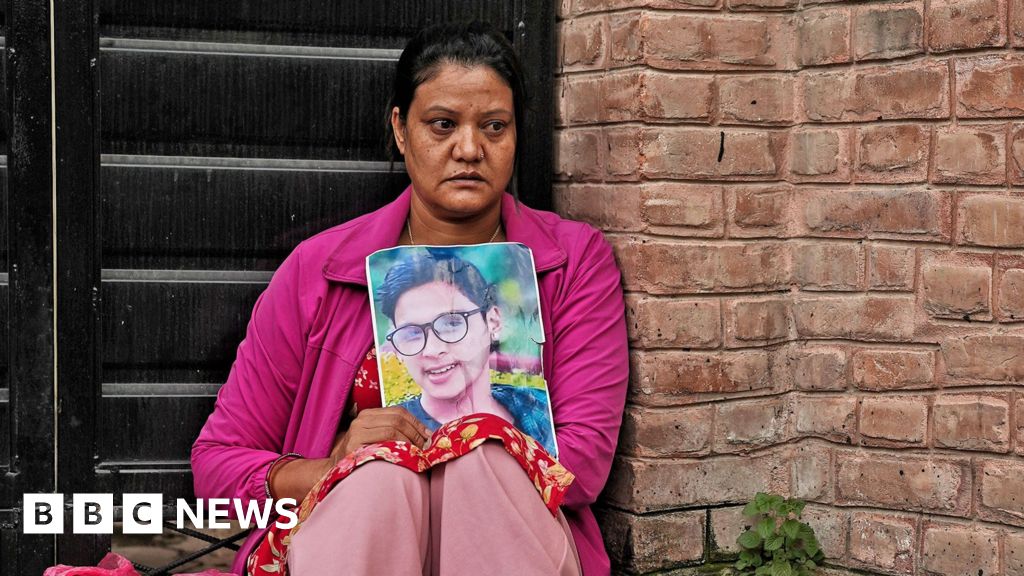Politics
Nepali Protests Turn Deadly as Government Faces Accountability Demands

Protests against corruption in Nepal escalated into violence last week, resulting in more than 70 deaths and over 1,000 injuries. The unrest was triggered by a government ban on social media platforms, which many viewed as an attempt to silence dissent. Crowds clashed with security forces, leading to a chaotic situation in which police are accused of firing on demonstrators.
Narendra Shrestha stands outside the mortuary of Tribhuvan University Teaching Hospital in Kathmandu, grieving the loss of his son, Sulov, who was shot during the protests. “Everyone said rubber bullet, rubber bullet. It was not a rubber bullet,” he said, expressing his anguish. The 21-year-old was among many young lives cut short in the unrest, which began on September 4, 2023. Shrestha’s pain is mirrored by numerous families who await news of their loved ones, each with dreams now extinguished.
The protests initially sparked over the government’s decision to restrict access to platforms like Facebook, X, and YouTube, citing a need to regulate misinformation. This decision angered many, as social media plays a vital role in daily life for millions in Nepal. As the protests grew, so did the violence, culminating in the burning of government buildings and homes belonging to politicians.
Witnesses described the chaotic scenes, where protesters armed with makeshift weapons clashed with police who reportedly used live ammunition. Casualty figures continue to rise as authorities assess the aftermath. Dr. Santosh Paudel from Bir Hospital recounted treating patients with serious injuries: “We saw two types of bullets clearly, the long one fired by shotguns and the small ones fired from rifles.”
Amidst the turmoil, Nepal’s interim Prime Minister, Sushila Karki, faces the daunting task of restoring order and public trust. Karki, who previously served as chief justice, has promised to hold fresh elections on March 5, 2026. Her government must also launch an investigation into the violence, focusing on accountability for those responsible for the deaths and injuries.
Families like that of Rasik KC, who is waiting to identify his nephew, Rashik Khatiwada, are demanding justice. “We want justice,” he declared, echoing the sentiments of many who feel let down by the government. Khatiwada, a 22-year-old, was shot twice in the chest, a tragic victim of the escalating unrest.
As the situation develops, the public’s frustration is palpable. Young people, who started the protests under the banner of “Generation Z,” are calling for systemic change. The atmosphere in Kathmandu remains tense as citizens grapple with the possibility of a government that no longer reflects their needs or concerns.
With hospitals overwhelmed during the protests, medical staff reported unprecedented challenges. Ranjana Nepal, an information officer at the Civil Service Hospital, noted that they treated over 450 patients in just two days. “We had never come across a disaster like this,” she remarked.
The deaths of young individuals such as Subash Bohora, Ayush Thapa, and Abishek Chaulagain have become symbolic of the broader societal discontent. Each had aspirations for their futures, now tragically cut short.
As the dust settles, the question looms: who will be held accountable for the violence? The government has promised an investigation, but for grieving families like Shrestha’s, assurances are not enough. “Sorry doesn’t make a dead son come alive again,” he said, capturing the profound loss that resonates throughout the nation.
The path forward for Nepal remains uncertain, marked by a need for justice and a renewed commitment to addressing corruption at all levels of government.
-

 Lifestyle3 months ago
Lifestyle3 months agoHumanism Camp Engages 250 Youths in Summer Fest 2025
-

 Sports3 months ago
Sports3 months agoDe Minaur Triumphs at Washington Open After Thrilling Comeback
-

 Business4 months ago
Business4 months agoKenvue Dismisses CEO Thibaut Mongon as Strategic Review Advances
-

 Sports4 months ago
Sports4 months agoTupou and Daugunu Join First Nations Squad for Lions Clash
-

 Top Stories4 months ago
Top Stories4 months agoColombian Senator Miguel Uribe Shows Signs of Recovery After Attack
-

 World4 months ago
World4 months agoASEAN Gears Up for Historic Joint Meeting of Foreign and Economic Ministers
-

 Business4 months ago
Business4 months agoOil Prices Surge Following New EU Sanctions on Russia
-

 Health3 months ago
Health3 months agoNew Study Challenges Assumptions About Aging and Inflammation
-

 Entertainment3 months ago
Entertainment3 months agoDetaşe-Sabah Violin Ensemble Captivates at Gabala Music Festival
-

 Entertainment3 months ago
Entertainment3 months agoBaku Metro Extends Hours for Justin Timberlake Concert
-

 Business4 months ago
Business4 months agoU.S. House Approves Stablecoin Bill, Sends to Trump for Signature
-

 Top Stories4 months ago
Top Stories4 months agoRethinking Singapore’s F&B Regulations Amid Business Closures









